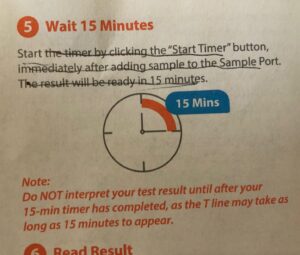 My 92-year-old mother takes this COVID business very seriously, as one would expect from someone in a high-risk group. She’s double vaxxed and boosted. And she is assiduous about testing herself and others who enter her house. At the same time, she’s frugal, and a testing two-pack costs about $25 at the drug store. So, when the federal government promised to send every American two free test kits, she jumped at the offer.
My 92-year-old mother takes this COVID business very seriously, as one would expect from someone in a high-risk group. She’s double vaxxed and boosted. And she is assiduous about testing herself and others who enter her house. At the same time, she’s frugal, and a testing two-pack costs about $25 at the drug store. So, when the federal government promised to send every American two free test kits, she jumped at the offer.
The test kits duly arrived a few days ago, and my mother had an occasion to test herself. As she pored through the instructions, she came across Step 5, pictured above, which says, “Start the timer by clicking the ‘Start Timer’ button….”
By referring to the Start Timer button, the instructions implied that such a button was to be found in the kit. But it wasn’t.
 The kit included a swab, a tiny plastic beaker with fluid, a stand to hold the beaker, and the device shown at left. You swab your nose, dip the swab into the beaker, mix it all up, and squeeze three drops into the testing device. There is no “start button” anywhere to be seen.
The kit included a swab, a tiny plastic beaker with fluid, a stand to hold the beaker, and the device shown at left. You swab your nose, dip the swab into the beaker, mix it all up, and squeeze three drops into the testing device. There is no “start button” anywhere to be seen.
Now, it is no great burden to find your own timer. iPhones have stop watches. Stoves have timers. If all else fails, you can watch a clock. It’s not as if the failure to include a timer with the test kit invalidates the results. But it can prove unnecessarily confusing to test-takers who might wonder, is something missing from the kit? Am I too dim to identify the timer button?
Personally, I’m a go-with-the-flow kind of guy, and I’d just blow it off. Obviously, someone screwed up, but there’s an easy work-around. However, not everyone is as loosey-goosey as I am. My mother, by contrast, finds the lack of a timer button to be a source of considerable consternation. Moreover, if directions are wrong about that, what else did they mess up?
There’s another layer to the story. This particular COVID test kit was made by a company called iHealth Labs, Inc. California-based iHealth sells home-health devices such as glucose and blood-pressure monitors, pulse oximeters, and body analysis scales. The website reveals nothing about its ownership.
But according to Fierce Biotech, iHealth is a subsidiary of Andon Health, a Chinese home health product manufacturer. The company recently snagged a $25 million investment from Xiaomi Ventures, a Chinese venture capital firm. Its CEO is Yi Liu, who I presume is Chinese.
In November, iHealth Labs won an Emergency Use Authorization (EUA) for its home-testing kit from the U.S. Food and Drug Administration. A press release stated that the company would sell its two-test kits for $14, which is cheaper than American-manufactured kits that can be purchased in Virginia drug stores.
In January the Biden administration announced that it would spend $1.3 billion to buy COVID test kits from iHealth Labs as part of its commitment to ship 500 million kits to U.S. households. That sum compares to a paltry $340 million spend for U.S.-based Roche Diagnostics and $306 million for U.S.-based Abbott Rapid Dx, North America.
My mom’s bottom line: “Millions if not billions of taxpayer dollars were spent so [the government] could buy virus tests with inaccurate directions that were made in China!” So much for promoting American products and American manufacturing!
Bacon’s bottom line: I hope the Chinese-made kits do a better job of detecting COVID than Chinese-made vaccines do in protecting them!


